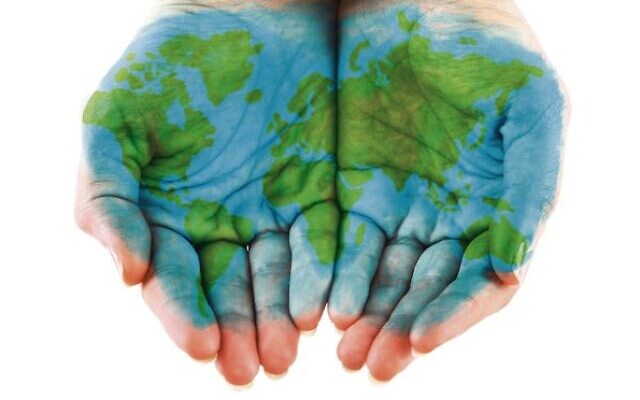The future of the planet is in our hands
'As Jews, our tradition understands that humans and the health of the land are inextricably linked.'
THIS year in Israel, we are observing the Shmita, a year-long agricultural sabbatical where farmers are commanded by the Torah to leave their fields fallow and to abstain from agricultural activity. This allows the land to rest and rejuvenate.
Shmita takes place every seven years, and I can’t help but make a connection between the halachic requirement to treat the land of Israel with respect and provide it with a break, and the COP26 summit hosted by the United Nations 2021 Climate Change Conference currently being held in Glasgow.
This international gathering has been called by the host nation’s Prime Minister Boris Johnson a “turning point for humanity”. Among the world leaders attending the global gathering are Israel’s Prime Minister Naftali Bennett and our very own Australian PM Scott Morrison.
I believe I speak for many millions of concerned Australian citizens when I say: enough is enough. We want our children to inherit a world that is in a better condition than the one we found it in, and we need to take decisive action to make this happen through combating climate change.
Australia must join the global community to find solutions and strategies to deal with the growing threats that our environment is facing. Governments around the world cannot continue to ignore the problems caused by this scourge.
With recent reports noting that Australia alongside Japan and Saudi Arabia are among several countries requesting the UN downplay the world’s need to rapidly move away from burning fossil fuels and to pivot to using greener energy sources, this is a time for leadership from anyone who has a voice.
These world events have got me thinking specifically about the Torah’s perspective on climate change. We are in a Shmita year, a year specifically designed to rejuvenate our land and to keep it healthy. For farmers in Israel, the Shmita is a scary prospect, leaving the land fallow when your livelihood is so entrenched with the produce it provides.
However, the Torah notes that the blessings that the farmers will reap for leaving their land fallow will far outstrip any of the negatives. In Leviticus 25, God promises the Jewish people that the crop of the sixth year will sustain them for the seventh, eighth and even the beginning of the ninth year!.
Shmita teaches us that some things are worth waiting for, which in turn creates space for new opportunities and renewal. Looking at the accelerating weather events that are wreaking havoc around the world, we know that the time has come to implement meaningful changes to help combat the growing risks that our environment is facing.
Extreme hurricanes, storms, droughts and, closer to home, bushfires. Just some of the freak weather events we’ve experienced of late. No one wants to live in a world where these become increasingly common.
As we witness the outcomes of sustained inaction, where species will disappear, oceans will rise, climate refugees forced from their homes due to extreme conditions, we know that the time for action is now.
It is for this very reason that along with 30 other high-profile signatories, I joined a growing number of concerned Australian leaders asking our government to change course and start taking real action against climate change.
The petition was organised by Global Citizen, an international organisation dedicated to lobbying for real solutions to real problems.
The signatories were diverse and included pop stars Jessica Mauboy and 5 Seconds of Summer, as well as Sam Lani, the program director of the UN Sustainable Development Solutions Network and Mat Tinkler, the deputy CEO of Save the Children Australia, amongst others.
As the only religious leader who signed the petition, I felt it was important to have the voices of faith communities represented. The Australian government – no matter which party is in charge – should know that concerned citizens want more to be done, and that this desire is across the board, from all people, from all professions and from all walks of life.
And faith leaders are not exempt from this equation.
We need to raise our voices, to have them heard, and to bring our congregations along with us as we face the growing threats that climate inaction will lead to.
As Jews, our tradition understands that humans and the health of the land are inextricably linked. Shmita teaches us that sometimes drastic measures are required to bring about a reset . Just as we leave the land fallow and place our trust in God, we see the need to reset the agenda of the world’s governments to push climate change to the fore.
The Midrash in Kohelet Rabbah (7:13) has a beautiful parable, where God shows Adam the world that has just been created and states, “Look at My works! How beautiful and praiseworthy they are. Everything that I have created, I created for you. Take care not to damage and destroy My world, for if you destroy it, there is no one to repair it after you.”
As the Australian government pivots its position to include net zero emissions by 2050, we must continue to demand more action from our leaders. As Jewish people, we know that we must rely on God, but we also know that God has given us this earth and that as its custodians we are required to take care of it and care for the environment.
Shmita is a perfect reminder of this and as we head into a new phase of governmental action, we must push our leaders for continued meaningful changes. The time is now,
Rabbi Gabi Kaltmann is rabbi of the ARK Centre in Hawthorn East.


comments